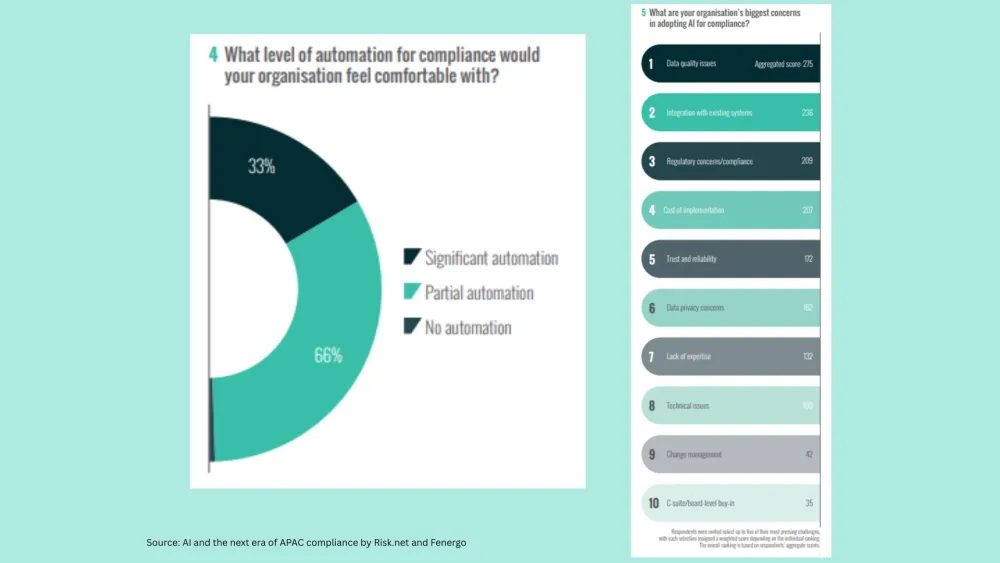Human-machine collaboration could be a big boon for financial firms, if only they fully embrace it
By Divyesh Vithlani and Andrew WoolfArtificial intelligence has been a topic of conversation and a part of business for years, from rogue robots in movies to neural networks that detect fraud at credit card companies, but only recently have companies really started experimenting with and implementing it more widely.
For financial services firms, the foray into AI has meant massive gains in productivity and efficiency the past years from automating tasks such as data gathering, entry and processing or account reconciliation. The real opportunity, though, remains untapped and is knocking on the doors of banks and insurers to embrace AI on a deeper level and in a much greater scale.
Many companies still see AI as a “good to have” that can help cut costs and improve their bottom line by automating a series of repetitive functions or replacing staff. Forward-thinking financial firms that see beyond those short-term gains, look at it as a “must have” and stand to leapfrog their competitors into a new era, where human creativity combines with AI to develop new products and services, create entirely new jobs and break into new markets.
That’s what we call “applied intelligence” and the math for the combination would be something like 1+1 = 11, not 2, where human ingenuity and personal touch plus machines’ efficiency and precision create new sources of growth for companies. This transformation requires a very different workforce to fully reap its rewards. With the pace of technology changing so fast, banks and insurers need to take urgent action and invest in teaching their staff new skills and new ways of working, meaning that their future workforce needs to start now.
Embracing AI and preparing for a different workforce is vital and companies need to realise the strategic importance of adopting intelligent technologies. That’s particularly true in the Asia Pacific region, where only 43 percent of financial services leaders believe human-machine collaboration is important to achieve their strategic priorities, much lower than the 61 percent of executives in Europe of 50 percent in the United States, according to our Future Workforce survey in banking.
A separate report showed that 79 percent of respondents globally believe that within two years, AI will work next to humans in their organisation as a co-worker, collaborator and advisor. The numbers in Asia Pacific are fairly similar,80 percent of respondents in the banking industry and 91 percent of insurers believe that AI will work next to humans over that time frame.
Technology advancements will disrupt the way financial firms work. Globally, banks stand to grow their revenue by 34 percent between 2018 and 2022 with the help of AI and insurers could see an increase of 17 percent, while also expanding employment levels by 14 percent and 7 percent respectively, according to our forecasts. Investing in reskilling employees to work alongside AI and other intelligent technologies is key to make that future growth in jobs and revenue happen.
Workers recognise they’re not fully prepared to handle an AI-powered future, with 72 per cent of respondents in the region placing a high importance on developing new skills to be able to work with intelligent technologies, signaling they’re eager to expand their knowledge. Additionally, 68 per cent of workers expect intelligent technologies to create opportunities for their work, highlighting the reality of AI in the workforce and the desire of employees to reap the benefits of the technology.
So, are financial firms ready to take the leap forward? Even with all the optimism around AI, senior banking executives estimate only 26 percent of their workforce is ready to work with intelligent technologies, creating a huge barrier to the implementation of AI in the future. Indeed, despite that large skill gap about what workers know and what they should know to embrace and fully utilise AI to reach peak performance, only a tiny portion of banks and insurance firms, 3 percent and 4 percent of those surveyed respectively, plan to significantly increase their investment in training programs in the next three years.
The contrast between top executives in the United States, where 9 percent plan to boost investments, and Asia Pacific, where none plan such increase, should raise some concerns in the region.
By investing so little, banks and insurers aren’t maximising their potential future returns or enjoying the true benefits of AI and risk being left behind by those fully committed to upskilling their employees.
For those that do decide to take the plunge, our research shows three key actions to help kickstart their workforce transformation:
- Banks and insurers need to think creatively about what work will look like in the future, so they can better understand how machines and people can collaborate. They can achieve that by assessing tasks, not jobs, creating new insight-driven and multi-skilled roles within their companies and mapping the skills to the new roles, so that any gaps in knowledge can be addressed with training or sourcing temporary workers;
- They also need to pivot their workers to areas that create new forms of value.
- Financial firms also should scale up “new skilling” to enable people to work with intelligent machines, by selecting and prioritising those specific talents and using digital tools including virtual and extended reality, among others, to expand the reach of skills programs.




















 Advertise
Advertise











